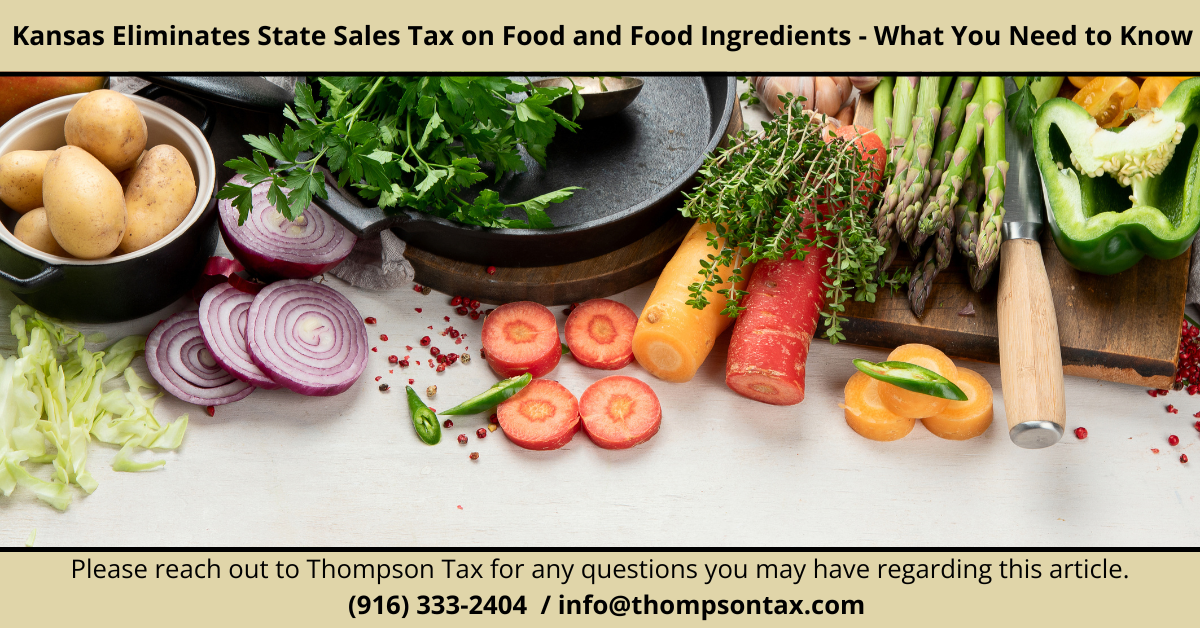
Effective January 1, 2025, Kansas eliminated the state’s sales tax on food and food ingredients, a significant development that has implications for consumers, retailers, and local governments alike. This long-anticipated change, outlined in Notice 24-21 issued by the Kansas Department of Revenue on December 9, 2024, aims to provide economic relief to households by lowering the cost of groceries. However, it also places new responsibilities on retailers to ensure compliance and prepare their systems for the transition. Here’s what you need to know about this change and its implications.
Overview of the Change
Kansas’ decision to eliminate the state sales tax on food and food ingredients marks a significant policy shift. The measure is part of broader efforts to reduce the tax burden on residents and address concerns over the rising cost of living. While the state-level sales tax will no longer apply, it is important to note that sales taxes imposed by cities and counties will still be in effect. This creates a dual-layered tax structure that retailers must navigate carefully.
Definition of Food and Food Ingredients
The Kansas Department of Revenue has clarified what constitutes “food and food ingredients” under the new policy. These include:
- Edible Items: Substances consumed for taste or nutritional value, such as fruits, vegetables, meats, and dairy products.
- Beverages: Items like bottled water, soft drinks, and juices, provided they meet the definition of a food or food ingredient.
- Exclusions: Prepared foods, alcoholic beverages, and dietary supplements are excluded from the tax exemption and remain taxable.
The detailed definitions and exclusions underscore the need for retailers to correctly categorize their products to ensure compliance.
Implications for Retailers
Retailers play a critical role in the successful implementation of this tax change. As of January 1, 2025, they must ensure their point-of-sale (POS) systems and software reflect the elimination of the state sales tax on qualifying food and food ingredients.
Key Action Steps for Retailers
- System Updates:
- Update POS systems to remove the state sales tax on eligible items.
- Retain the ability to apply local sales taxes for cities and counties that impose them.
- Training Staff:
- Educate employees on the updated tax structure to avoid errors at checkout.
- Ensure customer-facing staff can address questions about tax changes.
- Auditing Product Categories:
- Conduct a thorough review of product inventories to classify taxable and non-taxable items correctly.
- Collaborate with software vendors or tax consultants to implement accurate tax settings.
- Compliance and Record-Keeping:
- Maintain detailed sales records to demonstrate compliance with the new tax structure.
- Monitor local tax rates to ensure proper application of city and county taxes.
Implications for Consumers
The elimination of the state sales tax on food and food ingredients represents meaningful savings for Kansas residents. With the average household spending a significant portion of its income on groceries, this policy change can ease financial pressures, particularly for low and middle-income families.
Example Savings:
Assuming a 6.5% state sales tax, a household spending $500 monthly on groceries would save approximately $32.50 each month or $390 annually. While local sales taxes will still apply, the absence of the state tax reduces the overall burden significantly.
Local Sales Taxes Still Apply
Although the state sales tax will no longer apply to food and food ingredients, local jurisdictions retain the authority to impose their own sales taxes. This means that grocery purchases in Kansas may still be subject to city and county taxes, which vary across the state.
Challenges for Retailers:
- Variable Rates: Retailers must accurately calculate and apply local sales tax rates.
- Geographic Complexity: Businesses operating in multiple locations must account for differing local tax rates.
Consumer Awareness:
Consumers should be aware that the total sales tax on their grocery bills will depend on the location of the purchase. It is advisable to check receipts to ensure an accurate tax application.
Preparing for the Transition
The Kansas Department of Revenue has issued guidance to help stakeholders prepare for the changes. Retailers are encouraged to act promptly to avoid disruptions and ensure compliance. Here are key recommendations:
- Review the Official Notice: Read Notice 24-21 thoroughly to understand the scope and specifics of the policy change.
- Leverage Resources: Use tools and support offered by the Department of Revenue, including workshops, FAQs, and technical assistance.
- Engage Experts: Consider consulting with tax advisors or legal experts to navigate the complexities of the transition.
How Thompson Tax Can Help Businesses
At Thompson Tax, we specialize in helping businesses navigate complex tax changes quickly and confidently. Our expertise ensures that your business remains compliant while minimizing administrative burdens. Here’s how we can assist:
- Product Classification Assistance:
- Our team thoroughly reviews your products to ensure all items are correctly classified under the new rules.
- Ongoing Compliance Support:
- From routine audit cycles to detailed record-keeping solutions, we ensure your business is always prepared for success.
- Consulting Services:
- Our experts provide strategic advice on managing the dual-layered tax structure, helping you avoid costly errors and streamline operations.
Partnering with Thompson Tax ensures that your business can focus on its core operations while we handle the complexities of tax compliance. Contact us today!